In one inspiring meeting after the other, you and your colleagues are co-creating the most ambitious and engaging sustainability goals.
Everyone involved is excited, as are you. Yet, you can’t help but have this gnawing feeling that a little too much of your plan depends on others changing their behaviour. You might never get there if the end-users, citizens, colleagues or value chain partners do not cooperate. The most innovative plastic processing site, won’t be running at full speed if the community doesn’t collect the plastic to process. And your local council can set the ambition to reduce bio-waste but if people continue to waste food at this scale, you’ll never get there.
It’s clear, humans need to be as much part of the solution as they are part of the problem. However logical that sounds, that does not seem to be the popular approach. Just open the science section of a newspaper and you’ll see that most sustainability efforts are approached as a technical or economic challenge. We need to start treating it as a human challenge.
Redesigning behaviour for sustainability
A human view on sustainability is about reimagining our society and acknowledging people as an essential part of it. Humans are not predictable or rational machines and their behaviour is inconsistent and capricious. This makes it challenging to “redesign” behaviour. However, there is a large potential for looking at behaviour as many environmental problems are social and behavioural problems [1].
At Livework we wanted to address this challenge. Based on our understanding of behavioural sciences and design we came up with a four-step approach to address human behaviour for sustainability:
- Find out where the areas of impact are: Explore the value chains involved & analyse where the environmental impact is the greatest (e.g. production vs. use).
- Identify the people involved with the highest impact: Which people are involved in that part of the value chain and to which extent does their behaviour influence the environmental impact?
- Determine the level to design for: Is this problem addressed by changing a single user interaction or do we need to zoom out and take a more holistic view?
- Pinpoint the type of behavioural challenge: What kind of behavioural change is needed? Adopting a new routine is different from increasing informed decision making.
1. Find out where the areas of impact are
If you want to design for sustainability it doesn’t matter whether you are focusing on climate change or preventing loss of biodiversity. For both, it is important to understand which part of the value chain has the biggest impact. Is that during the extraction of raw materials? During production or manufacturing? During the use/consumption phase? Or during the processing of the materials at the end of life?
Take food waste for example. A lot of food available for consumption is wasted [2,3], of which 60% is wasted at the household level [4]. This means, in this case, focusing on consumption will be the most worthwhile.
2. Identify the people involved with the highest impact
Usually, there are many stakeholders involved in each value chain step. It varies from stakeholder to stakeholder how much environmental impact their behaviour has. To design effectively, we need to pinpoint which people play a key role. Take for example the aviation industry, where a large part of its impact comes from “use” i.e. the actual flights. It would be most straightforward to change the behaviour of the traveller: e.g. taking a train instead of a flight. However, there are other stakeholders involved that influence how big the impact is. Virgin Atlantic successfully reduced their fuel use and emissions by inspiring their captains to change their flight behaviour.
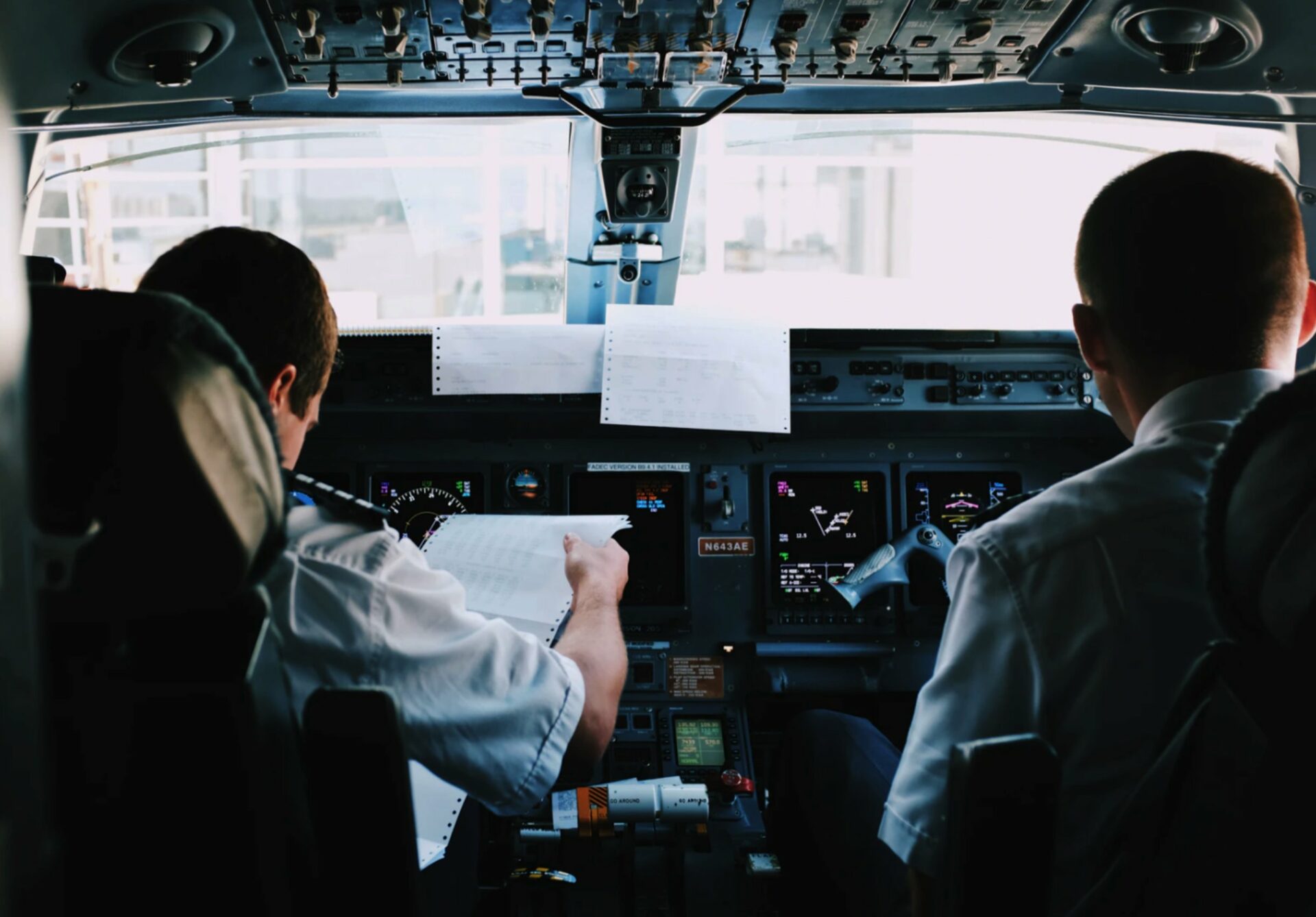
Mini Client Case
Improving fuel efficiency by changing behaviour of Virgin Atlantics captains
Virgin Atlantics objective is to improve their fuel efficiency and reduce carbon emission. After focussing on technological aspects (like fuel- efficiency measures) a closer look was taken into the behaviour of employees – in this case, captains. By monitoring fuel performance and performance targets captains were able to make more informed fuel-related decisions during pre-flight, in-flight and post-flight. The interventions appeared to be a very effective method to change behaviours and achieve fuel-, carbon, – and cost savings. Next to that, the captains reported a higher level of job satisfaction.
Often, we have to go beyond changing the behaviour of just one stakeholder in the system and include multiple ones. To reduce food waste, a lot of different stakeholders need to change their behaviour. The start-up “Too Good to Go” introduced a service that involved both food providers and consumers. They provide a platform to sell products about to reach their expiration date for a reduced price. In this context, both the behaviour of consumers and business owners needed to be addressed and appropriately designed for.
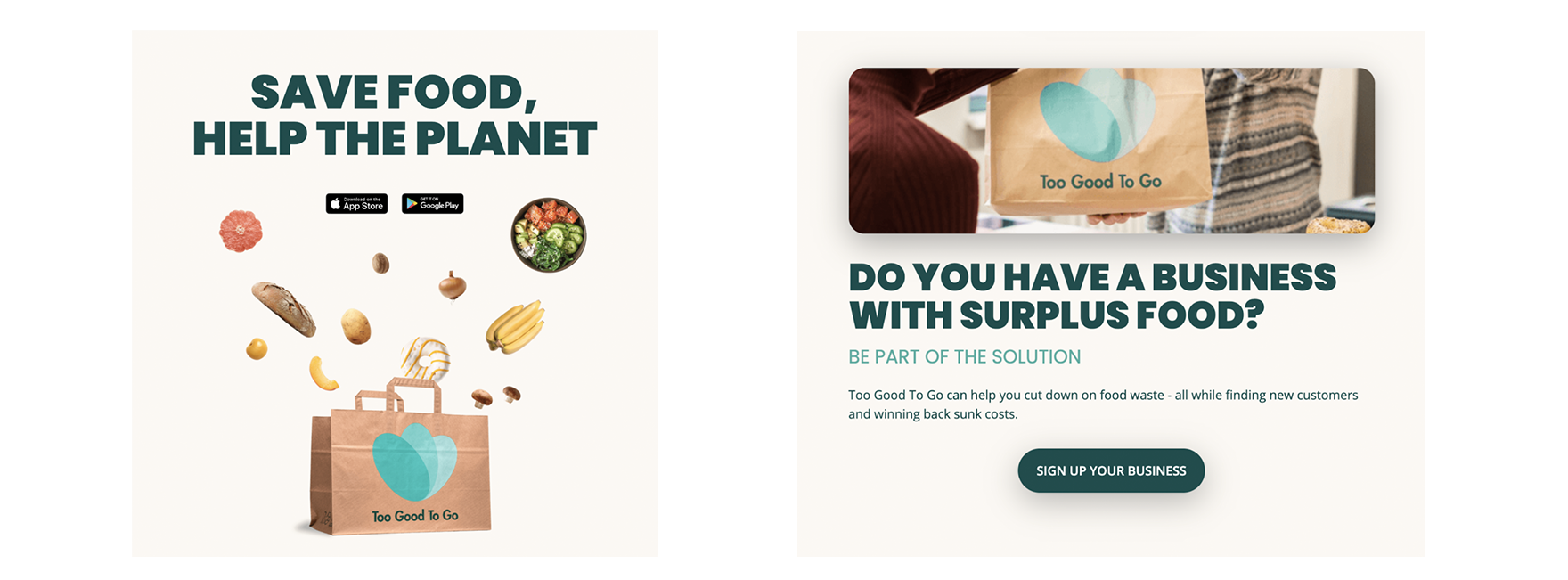 Too Good To Go adresses the behaviours and needs of both food consumers and business owners with a two-fold proposition [5].
Too Good To Go adresses the behaviours and needs of both food consumers and business owners with a two-fold proposition [5].
3. Determine the level to design for
When designing for behaviour change, it is important to understand at which “altitude” the behaviour should change or can be changed by your organisation. This topic is thoroughly explored in another article on designing behaviour at the right altitude. In short – people can behave at different altitudes depending on their relation to a business or context. As an example, I can behave as a human concerned about the amount of food I am wasting, a smart consumer researching my options for food waste composting, a pleased customer as I sign up for a composting pick-up service, and an irritated user as the provided composting bin is a sore to my eyes.
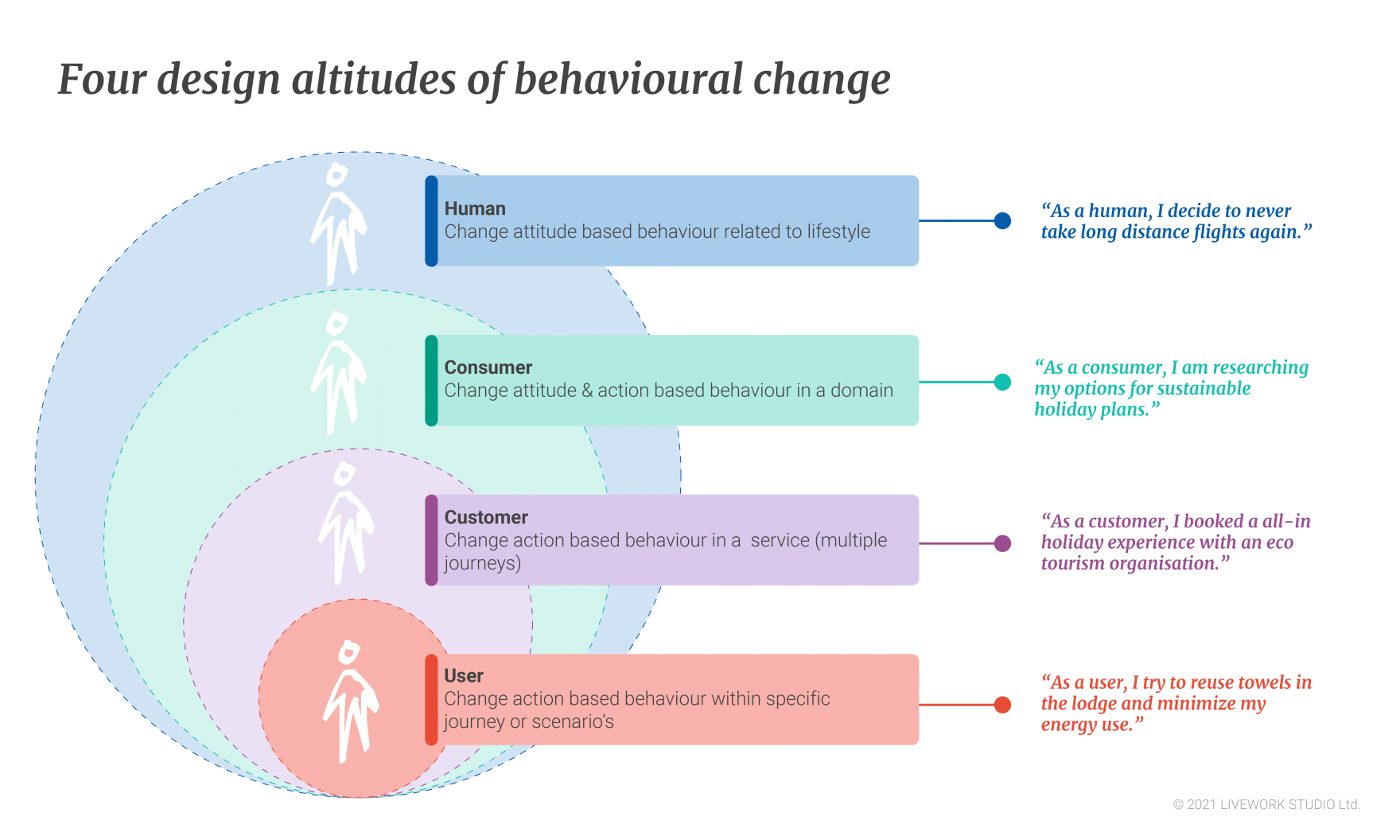 The altitude at which people’s behaviour should be addressed matters for finding the right solution. We distinguish four attitudes - from user, customer, consumer to human.
The altitude at which people’s behaviour should be addressed matters for finding the right solution. We distinguish four attitudes - from user, customer, consumer to human.
People can be at different altitudes depending on their relation to the context or organisation. The user, customer, consumer and human mind-sets can also coexist at the same time but translate to different motivations, needs, behaviours and pain points. Therefore, we need to determine at which altitude (user, customer, consumer or human) we need to design.
4. Pinpoint the type of behavioural challenge
There are many different types of behaviour changes that are related to the shift towards (more) sustainable services and scenarios. Understanding what kind of behavioural challenge you are dealing with is crucial. The three behaviour change challenges that we distinguish at Livework are:
- The adherence to sustainable alternatives;
- The adoption of new routines; and
- The activation of more informed decision making.
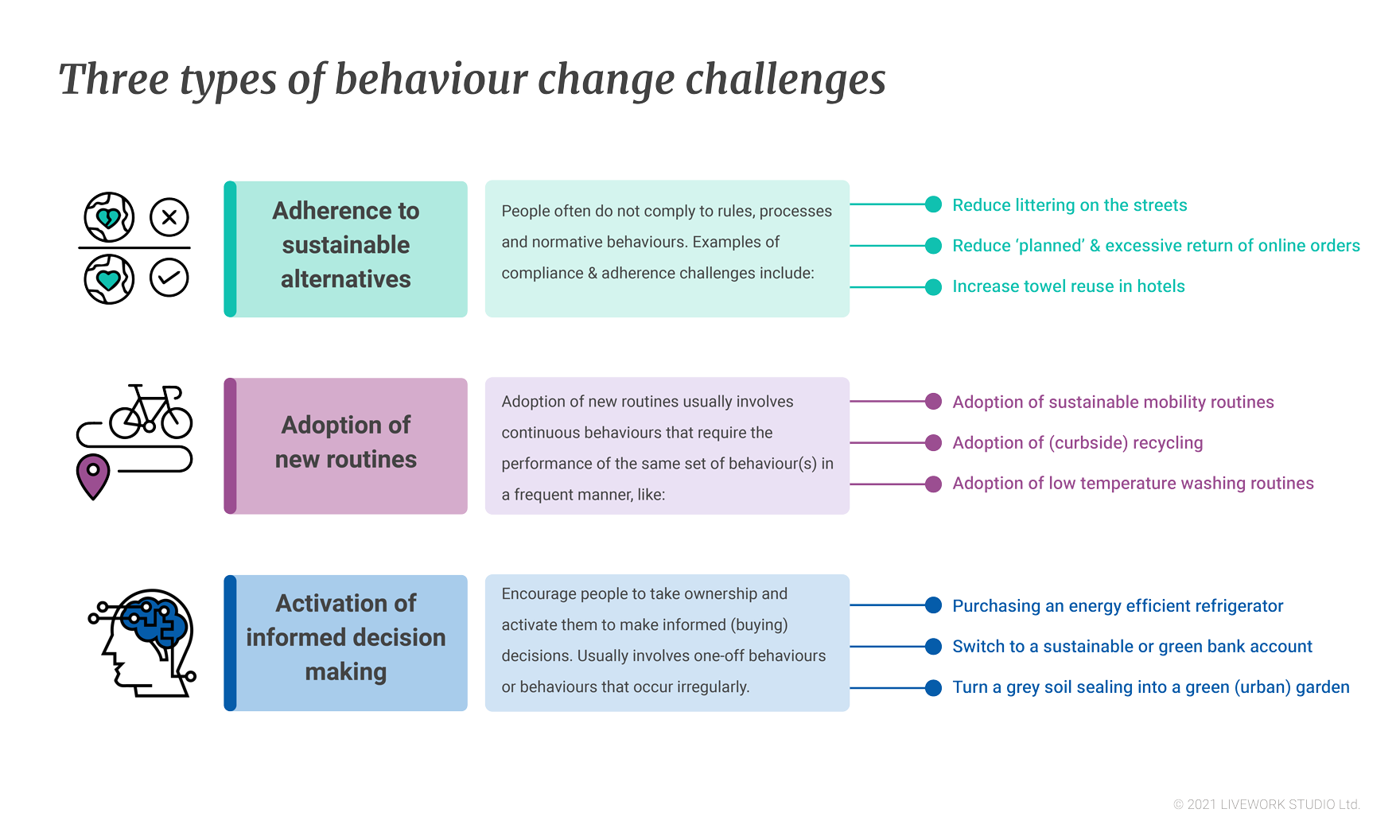 We distinguish three types of behaviour change challenges: compliance, adoption and activation. These categories are not mutually exclusive, but provide direction to what type of approach to changing behaviour could be effective. In academic literature [6,7,8], you’ll find various other categorisations related to sustainable behaviours. In our experience, these are helpful when it comes to analysing behaviour change but not so much when designing for them. Therefore, we work with this outcome-based categorisation.
We distinguish three types of behaviour change challenges: compliance, adoption and activation. These categories are not mutually exclusive, but provide direction to what type of approach to changing behaviour could be effective. In academic literature [6,7,8], you’ll find various other categorisations related to sustainable behaviours. In our experience, these are helpful when it comes to analysing behaviour change but not so much when designing for them. Therefore, we work with this outcome-based categorisation.
Often, we need to combine multiple behaviour changes at multiple altitudes. As a hypothetical example: For the development and implementation of a new scooter sharing service, the design challenges might include:
- Empowering new customers to make an informed decision on joining the service or buying/owning a scooter.
- Supporting them to adopt a new routine of planning and reserving the vehicle on time
- Helping users of the service to comply with the guidelines for parking and using the vehicle.
A framework to design pro-environmental behaviours
We see a lot of ideas and products that try to target unsustainable behaviour. We think that many of these efforts are too narrowly focused. For example, a shower sensor to reduce water usage.
But, designing for sustainability involves the performance of multiple behaviours at all altitudes, by different people in the system, often over longer periods of time rather than a single activity, or a single instance. This requires a design process that is mindful of that.
The framework below helps us to be mindful of that. It serves as a first step to identify what kind of challenge needs to be tackled, at which altitude and subsequently helps to find the best design approach.
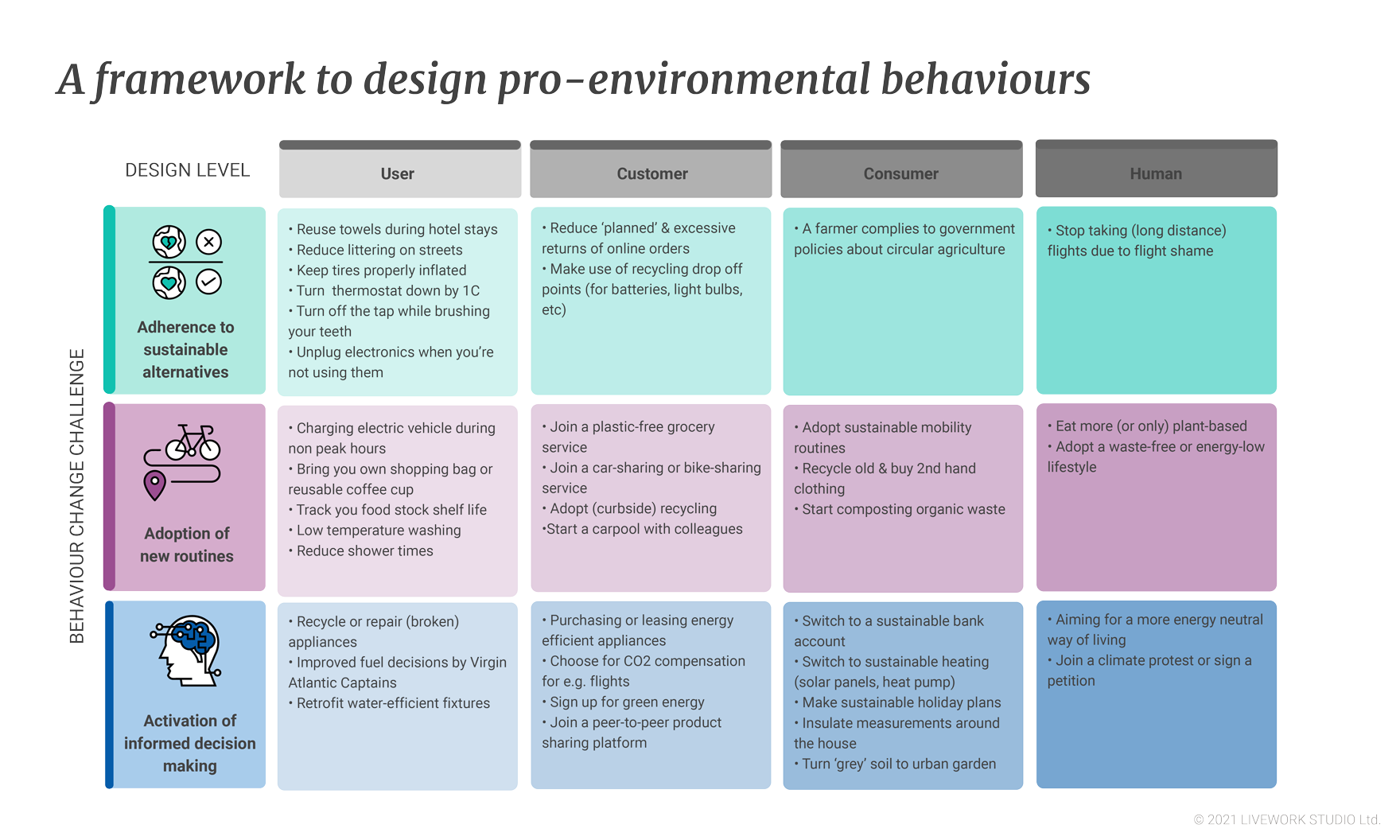 Examples to show different types of behavioural changes at the four design altitudes. A useful framework to (re)design a behavioural change towards more sustainable behaviour.
Download in PDF
Examples to show different types of behavioural changes at the four design altitudes. A useful framework to (re)design a behavioural change towards more sustainable behaviour.
Download in PDF
Four steps to more sustainable behaviour
If you want to take your organisation’s sustainability ambitions forward, remember to tackle the human challenge as well as the technical and economic challenge. The four-step approach described serves as a solid beginning:
- Find out where the areas of impact are
- Identify the people involved with the highest impact
- Determine the level to design for
- Pinpoint the type of behavioural challenge
We are interested to know about the human challenges you encounter. At what altitude do they live and what kind of behavioural changes do they address? Please reach out if you would like to share thoughts and compare ‘theories’.
Our next article will zoom in on the practical use case of this approach. We will describe how it can point the design process towards the most optimal opportunities for behaviour changes needed. Stay tuned!
Sources
[1] Vlek, C., & Steg, L. (2007). Human Behavior and Environmental Sustainability: Problems, Driving Forces, and Research Topics. Journal of Social Issues, 63(1), 1–19.
[2] Gustavsson, J., Cederberg, C., Sonesson, U., Van Otterdijk, R., & Meybeck, A. (2011). Global food losses and food waste: Extent, causes and prevention.
[3] Parfitt, J., Barthel, M., & MacNaughton, S. (2010). Food waste within food supply chains: Quantification and potential for change to 2050. Philosophical Transactions of the Royal Society B: Biological sciences, 365, 3065-3081. doi:10.1098/rstb.2010.0126
[4] van der Werf, P., & Gilliland, J. A. (2017). A systematic review of food losses and food waste generation in developed countries. Proceedings of the Institution of Civil Engineers-Waste and Resource Management, 170, 66-77.
[5] Join our Food Waste Movement. (2021). Too Good To Go.
[6] Moore, H., & Boldero, J. (2017). Designing Interventions that Last: A Classification of Environmental Behaviors in Relation to the Activities, Costs, and Effort Involved for Adoption and Maintenance. Frontiers In Psychology, 8. doi: 10.3389/fpsyg.2017.01874
[7] Stern, Paul. (2000). Toward a Coherent Theory of Environmentally Significant Behavior. Journal of Social Issues. 56. 407-424. 10.1111/0022-4537.00175.
[8] Milton, M. (2010). Review of Conservation Psychology: Understanding and Promoting Human Care for Nature by Susan Clayton and Gene Myers. Ecopsychology, 2(1), 45–46.

I am a lead service designer and a researcher with a strong interest in human behaviour and user research. I work on the crossroads of service design, human behaviour and business to create meaningful customer experiences that deliver value to both the customer and business.
Related content

